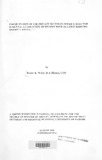| dc.description.abstract | Recent discussion of approaches to power sub-sector improvement in the energy sect
developing countries have tended to concentrate exclusively on privatization of the pt
power utilities. There is need for substantive studies on the ways to improve the lev
efficiency in the sub-sector. This study provides an overview of the issues ar
challenges related to the private sector participation in the power sub-sector in K<
From the very limited number of private companies having their own power prcdu
projects existing in Kenya ;Brooke Bond (k)Ltd in Kericho has been one of the
active in small-scale power production.
The main objective of this study was to find out the role the private sector could pl
the power industry. The extent of power generation by the company was assessed i
context of supply and demand .The guiding principal of the study was that producti
power by the company for its own consumption is ,in itself ,participation.
Chapter one of the study presents the introduction which include statement 0
problem ,the scope of the study ,study objectives and study assumptions. Chaptei
.• -~ -.l
--- .
reviews energy s~cit>·?'s::Currept status in the world. Chapter three examines the va
. .
issues which determines the location and/or sitting of power stations. Further, it brin ., ---various
attributes associated with different power sources ,and the consideration in
location. The chapter ends by coming up with a conceptual model which outlines thr
the private sector should be involved in the power industry. The concept of multi-ref
and multi-sectoral approach to power generation, distribution and transmission
discussed. This is focused on diverse renewable power resources prevailing in different
regions.
Chapter four presents background information of the study area. The physical
characteristics of the study area are discussed ,as they relate to generation of power from
hydro. Chapter five explains the methodology which was used in undertaking the study.
Chapter six examines production of power by the company .It evaluates the generation of
power by the company and the amount it imports from the national utility. The study
found out that the company can generate power efficiently for its own consumption.
The problem of formulation of relevant institutional and legal framework is discussed in
chapter seven, The study suggests the various ways of incorporating the private power
producers into the national utility system or supply power at regional level. The study
gives recommendations on the ways-\,vhich power development can be planned ,which
involves the private sector ;directly or indirectly. Lessons learnt from the case study are
outlined in this chapter. The study concluded that the private sector has a role to play in
power industry ;and therefore the various renewable energy sources at different regions
can be harnessed for power production by not only the public institution(s)but also the
private sector. | en |

